| Listing 1 - 10 of 29 | << page >> |
Sort by
|
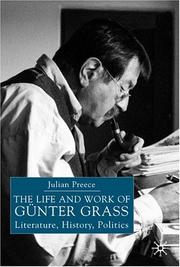
ISBN: 140391608X Year: 2004 Publisher: New York : Palgrave Macmillan,
Abstract | Keywords | Export | Availability | Bookmark
 Loading...
Loading...Choose an application
- Reference Manager
- EndNote
- RefWorks (Direct export to RefWorks)
Authors, German --- Ecrivains allemands --- Biography --- Biographies --- Grass, Günter, --- Grass, Günter,
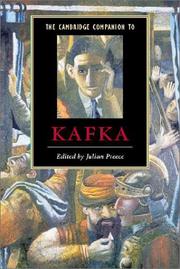
ISBN: 0521663911 0521663148 0511999801 1139816179 Year: 2002 Publisher: Cambridge : Cambridge University Press,
Abstract | Keywords | Export | Availability | Bookmark
 Loading...
Loading...Choose an application
- Reference Manager
- EndNote
- RefWorks (Direct export to RefWorks)
Franz Kafka's writing has had a wide-reaching influence on European literature, culture and thought. The Cambridge Companion to Kafka, offers a comprehensive account of his life and work, providing a rounded contemporary appraisal of Central Europe's most distinctive Modernist. Contributions cover all the key texts, and discuss Kafka's writing in a variety of critical contexts such as feminism, deconstruction, psycho-analysis, Marxism, Jewish studies. Other chapters discuss his impact on popular culture and film. The essays are well supported by supplementary material including a chronology of the period and detailed guides to further reading, and will be of interest to students of German, European and Comparative Literature, Jewish Studies.
Authors, Austrian --- Languages & Literatures --- Germanic Literature --- Kafka, Franz, --- KAFKA (FRANZ), 1883-1924 --- AUTEURS AUTRICHIENS --- CRITIQUE ET INTERPRETATION --- 20E SIECLE
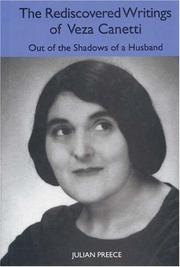
ISBN: 9781571133533 1571133534 9781571137005 9786612150548 1282150545 1571137009 Year: 2007 Publisher: Suffolk Boydell & Brewer
Abstract | Keywords | Export | Availability | Bookmark
 Loading...
Loading...Choose an application
- Reference Manager
- EndNote
- RefWorks (Direct export to RefWorks)
The Viennese playwright, novelist, and short-story writer Veza Canetti was born in 1897 into a mixed Sephardic-Ashkenazi Jewish family and died in 1963 in London. Part of the avant garde in 1920s Vienna (where she met her future husband and Nobel Prize winner, Elias Canetti), from 1932 she wrote radical short stories drawn from everyday life for the Vienna 'Arbeiter-Zeitung.' After censorship under the so-called Corporate State reduced her opportunities for publication, she disguised her critique in irony and humor, but from then on published little. Until 1990, when her first novel, 'Yellow Street,' was finally published, Veza was known only as her husband's muse and literary assistant. As more of her writings appeared, critics became convinced that it was he who was responsible for her decline into obscurity, notwithstanding his protestations of support and admiration. This biography tells a more nuanced story, presenting Veza's literary career against the background of her troubled times, drawing on Elias's unpublished papers to assess their literary partnership, showing how their early writings constituted a private dialogue on topics as diverse as feminism and Jewish identity and how several key themes in his work are anticipated in hers. Julian Preece is Professor of German at the University of Wales, Swansea.
Authors, Austrian --- Canetti, Veza, --- Taubner-Calderon, Veza, --- Avant garde. --- Censorship. --- Everyday life. --- Humor. --- Irony. --- Jewish identity. --- Literary career. --- Mixed Sephardic-Ashkenazi Jewish family. --- Novelist. --- Short-story writer. --- Veza Canetti. --- Vienna Arbeiter-Zeitung. --- Viennese playwright.
Book
ISBN: 9780511999802 9780521663144 9780521663915 Year: 2002 Publisher: Cambridge Cambridge University Press
Abstract | Keywords | Export | Availability | Bookmark
 Loading...
Loading...Choose an application
- Reference Manager
- EndNote
- RefWorks (Direct export to RefWorks)
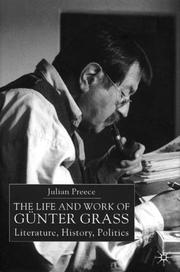
ISBN: 033379303X Year: 2001 Publisher: New York (N.Y.) Palgrave
Abstract | Keywords | Export | Availability | Bookmark
 Loading...
Loading...Choose an application
- Reference Manager
- EndNote
- RefWorks (Direct export to RefWorks)
Book
ISBN: 9781839024375 1839024372 Year: 2022 Publisher: London Bloomsbury on behalf of the British Film Institute
Abstract | Keywords | Export | Availability | Bookmark
 Loading...
Loading...Choose an application
- Reference Manager
- EndNote
- RefWorks (Direct export to RefWorks)
"Upon its release, Margarethe von Trotta and Volker Schlöndorff's The Lost Honour of Katharina Blum (1975) was a pivotal film for the New German Cinema movement. Released in the same year that members of the Baader-Meinhof gang went on trial for their politically-motivated crimes against corporate Germany, the film portrayed a female lead who, facing unjust persecution by the police and the media, resorts to lethal violence. Julian Preece's study considers what makes Katharina Blum new and radical, a turning point in numerous contexts, especially with respect to women's cinema and the portrayal of the female lead. Drawing on archival material including drafts of the screenplay, brochures and props, reviews and interviews, Preece traces the conception of the film and its development from the original short novel authored by Heinrich Böll, considering the differing contributions of the co-directors von Trotta and Schlöndorff. First-hand accounts by members of the cast and production team, including cinematographer Jost Vacano, producer Eberhard von Junkersdorf, and actors Angela Winkler and Mario Adorf, provide unique insight into the film's production. Inspiring numerous spin-offs throughout the 2000s, the film's themes continue to resonate with our contemporary moment, particularly in its depiction of a young woman's ordeal in a world run by men. Through an analysis of these adaptations (the most recent from 2014) Preece depicts the film's lasting influence, while also highlighting what makes the original film distinctive"--
Politics in motion pictures --- Journalism in motion pictures --- Terrorism in motion pictures --- Motion pictures --- History --- Trotta, Margarethe von --- Schlöndorff, Volker --- Böll, Heinrich, --- Böll, Heinrich, --- Criticism and interpretation. --- Criticism and interpretation. --- Film adaptations. --- Verlorene Ehre der Katharina Blum (Motion picture) --- Germany (West) --- In motion pictures.
Book
Year: 2004 Publisher: Basingstoke Palgrave Macmillan
Abstract | Keywords | Export | Availability | Bookmark
 Loading...
Loading...Choose an application
- Reference Manager
- EndNote
- RefWorks (Direct export to RefWorks)
Digital
ISBN: 9781571137005 Year: 2007 Publisher: Suffolk Boydell & Brewer
Abstract | Keywords | Export | Availability | Bookmark
 Loading...
Loading...Choose an application
- Reference Manager
- EndNote
- RefWorks (Direct export to RefWorks)
Book
ISBN: 9780230341074 Year: 2012 Publisher: New York : Palgrave Macmillan,
Abstract | Keywords | Export | Availability | Bookmark
 Loading...
Loading...Choose an application
- Reference Manager
- EndNote
- RefWorks (Direct export to RefWorks)
Terrorisme --- Politique et littérature --- German fiction --- German fiction --- Literature and society --- Left-wing extremists --- History and criticism. --- History and criticism. --- Rote Armee Fraktion --- In literature.
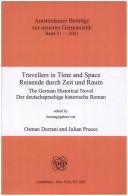
ISBN: 9042014059 9004333940 9789042014053 Year: 2001 Volume: 51 Publisher: Amsterdam ; New York : Rodopi,
Abstract | Keywords | Export | Availability | Bookmark
 Loading...
Loading...Choose an application
- Reference Manager
- EndNote
- RefWorks (Direct export to RefWorks)
| Listing 1 - 10 of 29 | << page >> |
Sort by
|

 Search
Search Feedback
Feedback About UniCat
About UniCat  Help
Help News
News